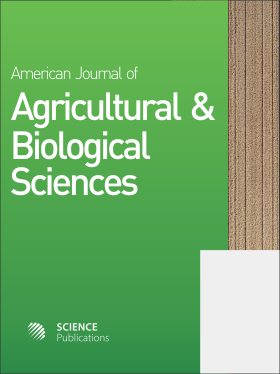Olfactory Responses of the Asiatic Citrus Psyllid (Diaphorina citri) to Mineral Oil-Treated Mandarin Leaves
- 1 Department of Agronomy, Faculty of Agriculture, Universities Pembangunan Nasional, ‘Veteran’ Yogyakarta, Jalan Lingkar Utara, Condong Catur 55283, Indonesia
- 2 Department of Plant Protection, Faculty of Agriculture, Universitas Gadjah Mada, Bulak Sumur, Yogyakarta 55281, Indonesia
- 3 School of Science and Health, University of Western Sydney, Locked Bag 1797, Penrith, New South Wales 2751, Indonesia
Abstract
Problem statement: Evidence of rejection or acceptance by phytophagous pests of citrus plants treated with mineral oils suggests that impacts of oils may be related to detection by olfactory and/or contact chemoreceptors of repellent oils or plant volatiles. Alternatively, the oils may mask or suppress attractant host plant volatiles. To date, no studies have reported that oils elicit an olfactory response in Diaphorina citri Kuwayama [Hemiptera: Psyllidae]. Therefore, we undertook two studies to determine how oil deposits on citrus leaves influenced the behaviour of D. citri. Approach: The attractiveness of citrus leaves treated separately with an nC21 horticultural mineral oil and an nC24 agricultural mineral oil to D. citri was evaluated under laboratory conditions. In the first of two studies, the oils were applied as 0.5% aqueous emulsions to mandarin leaves and responses of adults determined after they walked on surfaces saturated with either distilled water or 2% aqueous emulsions of the oils. In the second study, responses of adult psyllids to host-leaf volatiles, mineral oil volatiles emanating from leaves dipped in 2% v/v aqueous emulsions of each oil and similarly treated filter paper paired with water-dipped leaves were determined in single, linear-tube olfactometers. Results: In the first study, deposits of both oils significantly reduced the proportion of D. citri attracted to citrus leaves. Prior exposure of the insects to oil deposits did not influence this response. However, prior contact with the HMO slightly reduced the proportion of psyllids alighting on the water-dipped leaves. In the second study, oil volatiles emanating from filter paper significantly reduced the attractiveness of water-dipped mandarin leaves. Conclusion: These results indicate that application of the oils to the mandarin leaves may have: (a) suppressed release of attractant host plant volatiles; (b) masked attractant host plant volatiles; (c) led to the release of repellent volatiles from leaves and/or (d) to adults being repelled by oil volatiles. The results from the study using the olfactometer suggested that detection of mineral oil volatiles by olfactory receptors of adult D. citri contributed to their response to oil deposits on the mandarin leaves.
DOI: https://doi.org/10.3844/ajabssp.2012.50.55

- 4,729 Views
- 4,874 Downloads
- 27 Citations
Download
Keywords
- Citrus Vein-Phloem Degeneration (CVPD)
- Horticultural Mineral Oil (HMO)
- Agricultural Mineral Oil (AMO)
- prior exposure
- olfactometer suggested
